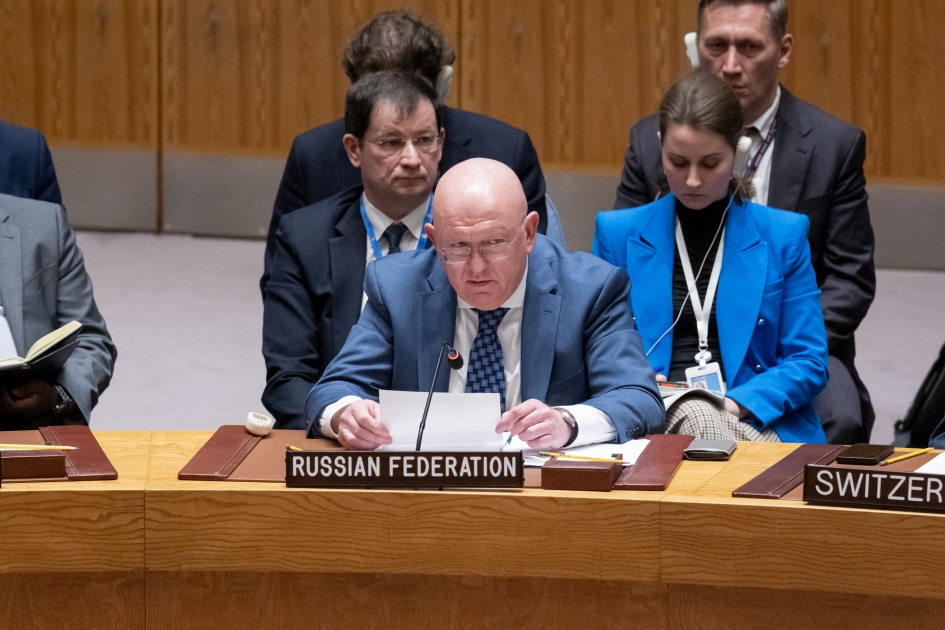Explanation of vote by Permanent Representative Vassily Nebenzia before UNSC vote on a US-proposed draft resolution on the Middle East, including the Palestinian question
Mr.President,
For two weeks now, the Security Council has been unable to articulate a collective message for de-escalation in the Israeli-Palestinian conflict zone. That is extremely deplorable. The bloodshed continues, with thousands of civilians dead and injured and more than 1.5 million IDPs. Just think of these egregious figures.
Russia suggested adopting a resolution calling for a humanitarian ceasefire back on October 16. It was a short, depoliticized, fully humanitarian draft. Unfortunately, it was not supported by the majority of Security Council members. National – or rather selfish, ideological and political – considerations outweighed the goal of stopping a humanitarian catastrophe.
Precisely one week ago, the United States obstructed the second attempt to elaborate a response to the gruesome crisis by using veto on a draft humanitarian resolution put forward by Brazil. What's more, they were the only ones to vote against Russia-proposed amendments that called for an immediate ceasefire and condemned all indiscriminate attacks against civilians.
From this, it clearly follows that the United States simply does not want UNSC decisions to influence in any way Israel’s possible ground operation in Gaza, which, while violating IHL, will risk provoking even a larger-scale conflict in the region or beyond.
Now the United States, seeking to subdue the harsh criticism of its veto on the part of the international community, tries to push through a new draft resolution that is full of politicized, inappropriate and highly questionable provisions. I want to make clear that the Council did not have a normal consultations process on this draft, despite our American colleague assuring us to the contrary. The sponsors ignored virtually every comment made by delegations, as well as the Council’s established practice of working on draft documents. Having set unrealistic deadlines, the American delegation explicitly denied other Security Council members the opportunity to consult with capitals.
No surprise that the “final product” falls short even on minimal quality standards.
It still contains no call for a ceasefire. It fails to condemn indiscriminate attacks on civilians and civil facilities in Gaza. It does not renounce acts aimed at forced displacement of civilians.
This document is politicized to the bone. Its only goal is not to save the civilians, but to secure United States’ political precepts in the region through “pinning labels”.
The sponsors used a tactical ploy and packed their draft resolution full with haphazard humanitarian measures that Israel could take in the course of its ground operation. In doing so, of course, they made sure that nothing in the draft would prevent West Jerusalem from carrying out an operation. As a matter of fact, the US draft resolution represents an UNSC authorization of such step while thousands of Palestinian children will continue to die. The Council cannot bind itself by such a resolution, otherwise - it would be discredited completely. My American colleague mentioned the many NGOs that are providing assistance. I would like to say that the first thing that these NGOs and humanitarian organizations that want to help are asking for is a ceasefire.
A separate major legal issue with the US draft is its reference to the right to self-defense. As confirmed by the International Court of Justice in a 2004 advisory opinion, the right to self-defense is inapplicable in the case of an occupying power. And that is exactly what Israel is with respect to the Palestinian territories.
We see no point in supporting a document that is designed solely for one purpose - to serve the geopolitical interests of one member of the Security Council, which is not only unable to stop escalation, but actually gives it a green light, only furnishing further military steps with a number of toothless humanitarian conditions. We trust that most of our Security Council colleagues will do the same thing as us. Otherwise, as I said, this will undermine the Council's authority dramatically.
In order for the UN Security Council to still be able to uphold its mandate to maintain international peace and security, we have prepared an alternative draft resolution. It is based on tested humanitarian language and incorporates the most useful elements from the American, Brazilian and the first Russian drafts.
We see no reason why members of the Security Council may fail to give our draft resolution a green light, unless a ceasefire and putting an end to this new round of violence is not part of their plan at all. This is the Council's last attempt to fulfill its noble functions. We call to not let go of it.
Thank you.
